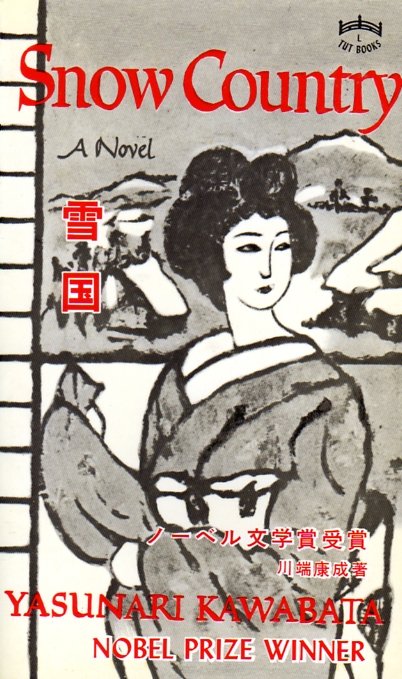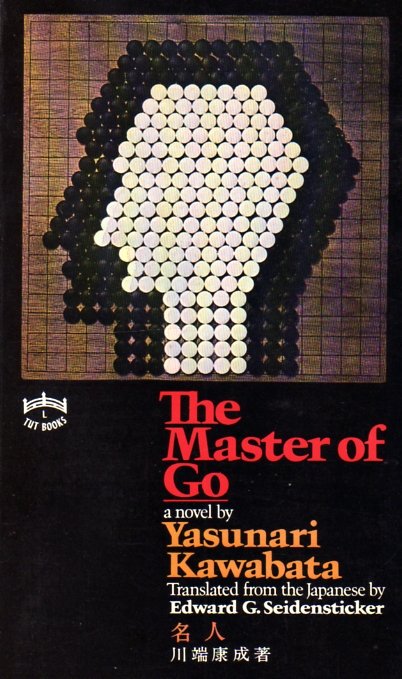Note: all images in this article are scanned from my own sources.
If ever there was a writer on the planet with the right to be miserable, it was Kawabata Yasunari. Initially born into a high-ranking family in 1899, both of his parents died when he was only four years old. He was sent to then live with his grandparents (one of whom died three years later), while his older sister whom he barely knew, went to live with an aunt and died when Kawabata was eleven. Four years later, his grandfather died, leaving him with no surviving relatives on his father's side of the family.
For a short time, life seemed to be looking up for him: he was taken in by his mother's relatives, continued his education, and moved to Tokyo where he passed the entrance exams for Tokyo Imperial University, and fell in love with a girl a few years younger than he was--they were soon engaged to be married. A happy Kawabata being something the world could not abide for long, the woman to whom his heart belonged was raped by a monk at the temple where she was staying. In light of this, she called off the wedding leaving a broken-hearted Kawabata to struggle through university alone. In subsequent years, Kawabata saw Japan surrender in the aftermath of Hiroshima and Nagasaki, the suicide of his good friend Mishima Yukio, and a diagnosis of Parkinson's disease before his death (possibly suicide, possibly unintentional--the jury's still out) at the age of seventy-two.

Throughout his life, Kawabata wrote his stories with a distinct focus on melancholy. Snow Country, his most famous novel and one of three for which he was awarded the Nobel Prize in Literature, describes the relationship between a man of the city and one of the geisha at a countryside hot spring he visits--a relationship which is, naturally, doomed to failure for a variety of reasons.

The Master of Go chronicles what could be the final game of Go played by the titular master against a young, up-and-coming champion. Told in a journalistic style (Kawabata worked as a reporter who covered the actual match upon which the book is based), the tale is a surprisingly human story of two mental gladiators going to war in an event as significant to the Japanese of the time period as the Super Bowl is to US audiences today. Naturally, in a story where two people compete and there can only be one winner, there's going to be sadness no matter who defeats whom. My favorite Kawabata quote, in fact, comes from this work:
After he became the Master, the world believed that he could not lose, and he had to believe it himself. Therein was the tragedy.
How often in life do we become the inadvertent victims of our own life story, and begin believing our own press? How often does the persona we adopt to engage with the rest of the world become welded to our own face, ensuring we can never remove the mask lest we disappoint not only the outside world, but our inner selves? Kawabata was correct: therein is the tragedy.

The Lake is perhaps best described as what Lolita would have looked like had its author been Japanese. Written in 1954, one year before Nabokov published his controversial novel, The Lake is the story of an unhappy, middle-aged school teacher named Gimpei and his failed relationships with the various women in his life. Gimpei is hardly a praise-worthy protagonist, but he's a darn sight more reliable main character than Humbert ever could be accused of being.
And then, there's Lavatory Buddhahood.

Written in 1929, this is one of the few stories Kawabata published that could be accused of being a comedy. While the ending is somewhat of a downer, the hilarity and absurdity of the entire piece which runs all of two and a half pages in his Palm-of-the-Hand Stories collection pictured above render it a comedy of errors on par with anything Shakespeare ever wrote.
Part of what makes the story so funny is its compactness. It can be read in a matter of minutes, and answers its own mystery almost as fast as the mystery itself arises. I first heard this story performed as a segment on Public Radio International's Selected Shorts program, where short stories with a connecting theme are read to a live audience by performers of the stage and screen, and I can still remember laughing my fool head off in the car upon hearing the ending.
Lavatory Buddhahood is toilet humor of the highest possible caliber, and the fact it was penned by a guy who, by all rights, lived a life with damn near nothing to laugh about, shows why we should always keep an eye on the funniest guy in the room. The tale is quite simple: a farming community overwhelmed with visitors during flower-blooming season sees an entrepreneurial peasant named Hachihei build a pay toilet and make a small fortune. Annoyed at the success of Hachihei, and determined to steal some of his thunder, another unnamed peasant (the protagonist) decides to build a privy so beautiful it will put Hachihei's to shame:
"First of all, for the four pillars, Yoshino logs would be dirty, so I'd use Kitayama knotwood. The ceiling would be bulrush, and I'd use a kettle chain in place of a rope. [...] I'd put windows in below ground level. And the planks will be of zelkova wood. The walls will be double-coated plaster, and the door will be of cypress. I'll shingle the roof with cedar and use Kurama stone for the step. Around it, I'll have a trellis of bamboo and beside the stone washbasin I'll plant a reed pine."
The result is...well, I'll let Kawabata explain:
The women of the capital merely gazed longingly at the privy, thinking it was just too beautiful to use.
(Hey, @blewitt, I think I have a solution to the problem of customers wrecking the Conquest Comics restroom!)
The man's wife berates him for spending all that money building the toilet, but he tells her to calm down and that tomorrow she best be ready for a rush of customers like she's never seen. All he needs her to do is pack him a lunch.
"I'll make some rounds and people will gather as though it's a village fair!"
His wife, needless to say, isn't happy about the situation...
"Make rounds," he had said. Was he planning to walk about the capital shouting, "Pay toilet! Pay toilet!"?
...but sees him off in the morning anyway. A short time later, much to her surprise, the toilet receives its first paying customer, and from that point on its a never-ending conga line of customers all eager to get into the beautiful lavatory. By the time business concludes for the day, she's had to empty the pot five times and taken in a small fortune. Naturally, because this is a Kawabata story, tragedy is revealed when she learns just how her husband managed to drum up so much business for his opulent commode, but the resultant response from the community upon learning of the man's fate is equal parts hysterical and somber.
No, I'm not going to spoil it. Read the story for yourself.
Kawabata is a phenomenal author; I've read the four pieces about which I've written, and am on the lookout to acquire more. I have Thousand Cranes and The House of Sleeping Beauties, but that still leaves plenty yet for me to purchase. Due to the subject matter of his writing, I have to take breaks between his novels--anybody who can binge Kawabata is made of sterner stuff than I--but I still want to experience them all.
The exception is Lavatory Buddhahood. I read that story at least every six months and have a good laugh. It is the least Kawabata-esque thing the man ever wrote, which just goes to show you don't have to stick to your winning formula all the time. Kawabata's writing is generally depressing, forlorn, and melancholic. His characters frequently dream of a past that no longer exists, idolizing an earlier time when they were not so down-trodden. It's something I myself am guilty of doing as well, having turned forty and officially entered "middle age" physically if not yet mentally or behaviorally.
Kawabata endured hardships during his life that no one should have to endure starting from a young age. As someone whose father died when he was just a kid, I can relate to the sorrow of his life's journey. Had Kawabata killed himself following the death of his parents, the loss of his grandparents, or any of the broken relationships with women which haunted him over the course of his seventy-two years, I would totally understand. Despite all these tragedies, Kawabata persevered, writing a dozen novels, numerous short stories, and ultimately winning a Nobel prize in literature for three books which gaze unflinchingly into the darker and sadder parts of the human condition. If he could shape his depression into the laser-sharp focus required to pen stories about unrequited love, impending death, and the impossibility of living up to one's own expectations, then maybe I can make it through one more long, dark night of the soul.
Maybe, in the end, all of us can.
Congratulations @modernzorker! You have completed the following achievement on the Steem blockchain and have been rewarded with new badge(s) :
Click here to view your Board
If you no longer want to receive notifications, reply to this comment with the word
STOPTo support your work, I also upvoted your post!
Downvoting a post can decrease pending rewards and make it less visible. Common reasons:
Submit
His life story is honestly kind of funny in how tragic it is. I have yet to read any of his books but this post motivated me to get on that a little sooner!
Downvoting a post can decrease pending rewards and make it less visible. Common reasons:
Submit
Congratulations! Your post has been selected as a daily Steemit truffle! It is listed on rank 8 of all contributions awarded today. You can find the TOP DAILY TRUFFLE PICKS HERE.
I upvoted your contribution because to my mind your post is at least 3 SBD worth and should receive 161 votes. It's now up to the lovely Steemit community to make this come true.
I am
TrufflePig, an Artificial Intelligence Bot that helps minnows and content curators using Machine Learning. If you are curious how I select content, you can find an explanation here!Have a nice day and sincerely yours,

TrufflePigDownvoting a post can decrease pending rewards and make it less visible. Common reasons:
Submit
I'm a bit late - but thank you for the review @modernzorker... 😊 I'll put them to my list... and I think I need more holidays for it...
Downvoting a post can decrease pending rewards and make it less visible. Common reasons:
Submit